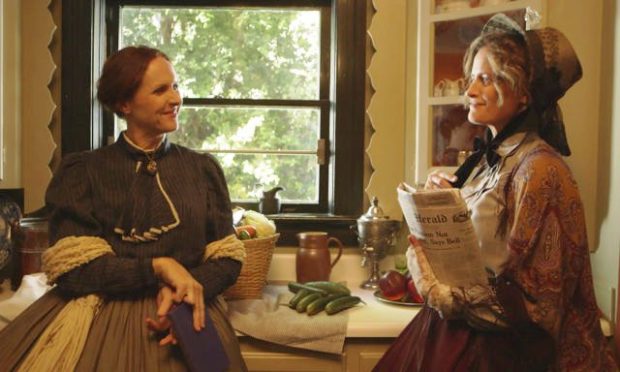
 A film about the love affair between the poet Emily Dickinson and her childhood friend Susan Gilbert gleefully satirizes the male-centric point of view on literary history.
A film about the love affair between the poet Emily Dickinson and her childhood friend Susan Gilbert gleefully satirizes the male-centric point of view on literary history.
I find it remarkable, considering how little we really know about her, that we’ve seen two films about the American poet Emily Dickinson in the last couple of years. There was Terence Davies’ A Quiet Passion, a serious drama that I reviewed on this show, and now a comedy, directed and adapted from her own play by Madeleine Olnek, called Wild Nights with Emily.
Well, right off the bat I need to say that I had low expectations of this film going in, because of the title, and because the previews seemed to promise something like a variety skit. Happily, this turned out to be another example of how a trailer can fail to convey the right impression of a film.
Molly Shannon, known best for her work on Saturday Night Live, plays Dickinson, who has a passionate love affair with a friend from her girlhood, Susan Gilbert, played by Susan Ziegler. This passion is reciprocated, even after Susan’s marriage of convenience to Emily’s brother Austin, who moves in next door, making the continuation of their affair much easier. Meanwhile, as a framing device, we see Mabel Loomis Todd, the woman who edited Emily’s poems after her death (and played by Amy Seimetz), pushing a distorted narrative about the poet as a neurotic recluse who wished not to be published in her lifetime, and left scattered hints of romantic desire for one or more unnamed men. Olenik seeks to shatter this myth, even as we see Todd, in a flash-forward, propagating it at a ladies’ literary gathering sometime in the 1890s.
Now, from the very beginning of this film, it becomes clear that this is a delightful satire, which works on many levels. First of all, it highlights the sexual ignorance and repression of that time. There really weren’t any clear notions of being “gay” or even of homosexuality in that era, at least not in common use. Emily and Susan are unaware of, and have no need of such labels, and their love is strong and sincere. Olenik does depict some humorous scenes based on the usual kinds of lovers’ quarrels and petty jealousies, and like the rest of the film, these scenes create laughs through an assumed modern point of view, although the language simulates 19th century manners.
More importantly, Wild Nights with Emily satirizes the attitudes of men towards women authors and just women in general—stupidly and hilariously oblivious, which at the same time points up the real discrimination Dickinson’s unconventional poetry suffered from male writers and editors. Far from not wanting to be published, we see her trying to get her work out and being repeatedly ignored and denied.
Finally, there’s a broader sense in which the movie ridicules the American 19th century itself, as well as the stuffy costume dramas about historical figures from that era that we’re used to seeing, and this is a delicate high-wire act that Olenik pulls off beautifully. The sets and costumes and diction are all accurate, more or less, but the way people talk and behave is slightly off. However, the letters and the poetry by Dickinson that are quoted in the film are all real, and the satire often lends them a different meaning than a literature professor would endorse, but without diminishing them at all. Modern research into the letters does, in fact, support Olenik’s thesis about Emily and Susan being lovers, but still, this isn’t realism—we’re expected to see through the parody and laugh at the folly of an era that is normally treated with kid gloves.
Shannon is marvelous, while the film seeks to re-imagine Dickinson as a woman with a strong will and heart, as opposed to the myth of her as a pitiful recluse. Wild Nights with Emily achieves that purpose through gentle sarcasm—and it’s surely one of the more pleasant surprises I’ve had in years.

